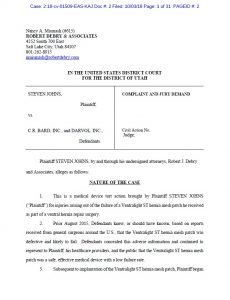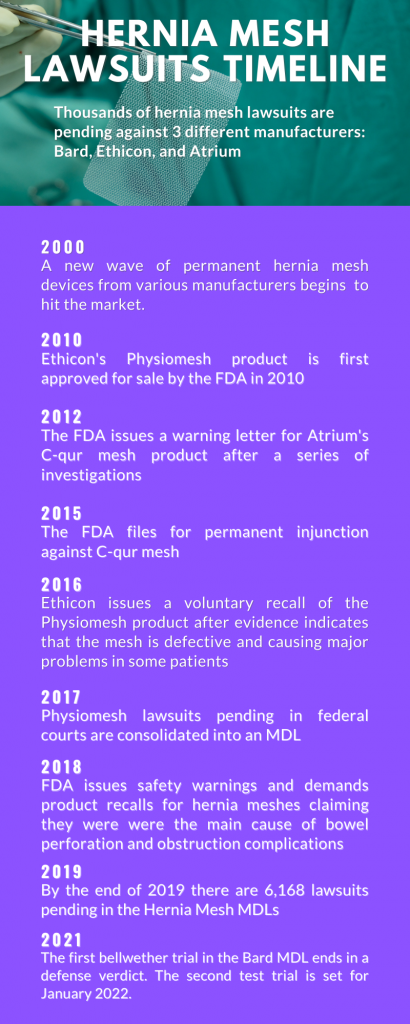The hernia mesh lawsuits have been litigated for years. For victims seeking settlement compensation, it has been a never-ending road. But with the court bouncing back from COVID, two trials are on the way that could be the bridge to a class action hernia mesh settlement to finally bring victims overdue settlement compensation for the harm done to them.
Over the last decade, countless individuals who underwent hernia repair surgeries subsequently suffered pain and serious injuries caused by a defective hernia mesh implant that was used in their procedure. There are currently thousands of hernia mesh lawsuits currently pending across the country and they have been consolidated into three separate class action MDLs.
Progress in all the hernia mesh class action MDLs got interrupted by the pandemic and resulting court closures. Now things are opening back up and it is shaping up to be an action-packed summer on the hernia mesh litigation front. In this post, we will look at the current status of each of the 3 separate hernia mesh MDLs and what to expect this summer as the first round of bellwether test trials get underway.
If you have a potential hernia mesh claim anywhere in the U.S. call our hernia mesh lawyers at 800-553-8082 or get a free online case review.
March 10, 2022 Update: The next hernia mesh trial – the most important trial in the history of this litigation – starts in Ohio on March 21, 2022.
November 2021 Update: The first bellwether trial (Johns v. C.R. Bard Inc.) resulted in a disappointing loss for the plaintiff. The jury found that the plaintiff failed to prove that his injuries were caused by the defective hernia mesh implant. The loss was not a major setback, however, because the case was hand-picked by the defense.
The second bellwether trial against Bard is set for January 2022. This second case was hand-picked by the plaintiffs so we should get a much better outcome. The defense previously filed a summary judgment motion to prevent this case from going to trial at all. In October, the MDL judge denied that motion clearing the last remaining obstacle to trial in the case.
If we get a big verdict in this second bellwether test trial, we could potentially see a global settlement fairly quickly. In a previous mass tort MDL involving another defective medical device, Bard settled all pending cases after just 2 bellwether trials.
History of the Hernia Mesh Litigation
 Hernia mesh implants are small pieces of mesh or net material that are used in hernia surgeries to help support and reinforce tissue and muscle walls. For the mesh to function safely inside the patient’s body, it must be made out of special materials that are biologically inert.
Hernia mesh implants are small pieces of mesh or net material that are used in hernia surgeries to help support and reinforce tissue and muscle walls. For the mesh to function safely inside the patient’s body, it must be made out of special materials that are biologically inert.
Unfortunately, a number of permanent hernia mesh implants that have been developed in recent years have turned out not to be biologically inert as designed. In certain patients, the materials in these hernia mesh implants have triggered a dangerous immune system response. In effect, the patient’s immune systems identified the mesh as a foreign object and attacked it like an infection. These immune responses led to numerous very serious complications and required the mesh to be surgically removed.
The problems with the hernia mesh devices and the resulting injuries that they caused prompted a steady wave of lawsuits. Soon there were enough pending hernia mesh lawsuits in federal courts around the country to prompt the Judicial Panel on Multidistrict Litigation to create 3 new class action MDLs for consolidated handling of the cases.
The Three Hernia Mesh MDLs
There are currently 3 separate hernia mesh MDLs, each involving claims against specific mesh manufacturers: (1) Bard; (2) Ethicon; and (3) Atrium. All three of these MDLs were formed around the same general time frame and involve factually similar claims of product liability. Although they are technically separate MDLs, they are very interconnected and will likely have a significant impact on each other as things move forward. Below is a brief summary of the current status for each of these hernia mesh MDLs and what we can expect from them this summer.
(1) The Bard Hernia Mesh MDL
The Bard Hernia Mesh MDL (In re: Davol, Inc./C.R. Bard, Inc., Polypropylene Hernia Mesh Products Liability Lit. – MDL-2846) is the largest of the 3 hernia mesh MDLs which is mainly because Bard was the biggest player in the hernia mesh device market. The Bard Hernia Mesh MDL is in the Southern District of Ohio and as of May 2021 is has 12,326 individual actions pending.
The Bard hernia mesh products at issue in this MDL include the 3D Max, Kugel, Composix, Ventralex, Ventrio, Sepramesh, and Ventralight. All of these products were widely utilized in hernia repair and similar surgical procedures. The first bellwether test trial in the Bard MDL is currently scheduled to begin on August 2, 2021.
The test case selected was Johns v. C.R. Bard Inc., et al., 2:18-cv-01509 from the District of Utah. The plaintiff, Steven Johns, underwent a ventral hernia repair in 2015 during which he received a Bard Ventralight ST hernia mesh patch. He subsequently experienced extreme pain and had to undergo extensive revision surgery when the mesh was not accepted by his body. The corrective surgery was successful, however, and Mr. Johns is not alleging any clear permanent injuries.
(2) The Ethicon Hernia Mesh MDL
 The next largest of the hernia mesh MDLs is the Ethicon Hernia Mesh MDL (In re: Ethicon Physiomesh Flexible Composite Hernia Mesh Products Liability Lit. – MDL-2782). As of May 2021, the Ethicon MDL has 3,561 active cases pending and consolidated in the Northern District of Georgia. Ethicon is a subsidiary of Johnson & Johnson and this was first of the hernia mesh MDLs, so it has gotten a disproportionate share of national attention.
The next largest of the hernia mesh MDLs is the Ethicon Hernia Mesh MDL (In re: Ethicon Physiomesh Flexible Composite Hernia Mesh Products Liability Lit. – MDL-2782). As of May 2021, the Ethicon MDL has 3,561 active cases pending and consolidated in the Northern District of Georgia. Ethicon is a subsidiary of Johnson & Johnson and this was first of the hernia mesh MDLs, so it has gotten a disproportionate share of national attention.
The sole product at issue in the Ethicon MDL is the PHYSIOMESH™ Flexible Composite Mesh. Unlike many of the other hernia mesh devices which are still be used to this day, the Physiomesh was actually taken off the market due to safety concerns. The first bellwether test trial in the Ethicon MDL was scheduled to begin this month (June 2021) but the trial was postponed, most likely because Ethicon has opted to settle the pending claims.
(3) The Atrium Hernia Mesh MDL
The smallest and most recent of the hernia mesh MDLs is the Atrium MDL involving its C-Qur line of mesh products (In re: Atrium Medical Corp. C-Qur Mesh Products Liability Litigation – MDL-2753). The Atrium MDL is in the District of New Hampshire and at last count it had 2,700 individual pending actions.
The first test case in the Atrium MDL is set for trial next month on July 7, 2021. The test case selected for trial is Barron, et al. v. Atrium Medical Corp., (1:17-cv-00742). The plaintiff is a middle-aged female who had a C-Qur mesh device implanted during her umbilical hernia repair surgery in 2014. The coating on the C-Qur mesh degraded and triggered an infection and recurrence of her hernia and 2 years later she underwent additional surgery to have the infected mesh removed.
Do I Qualify for a Hernia Mesh Lawsuit?
If you have a hernia mesh implanted during a hernia repair surgery (or another similar type of surgery) and subsequently experienced complications with the mesh that required additional surgery you can file a product liability lawsuit against the manufacturer of the mesh implant.
Is it Too Late to File a Hernia Mesh Lawsuit?
It is not too late to file a hernia mesh lawsuit (as long as the statute of limitations on your claim has not expired). Our firm is currently seeking new hernia mesh cases from anyone who was injured or underwent unnecessary surgery due to a defective hernia mesh implant.
How Much Money Can I Expect in a Hernia Mesh Settlement?
Our hernia mesh lawyers believe that hernia mesh product liability claims may have a settlement value between $50,000 and $1,000,000.
Yes, this is a broad range of expected settlement compensation payouts. The settlement range is so wide because injuries in the hernia mesh cases are very different. Some defective hernia mesh implants caused serious, permanent injuries or even death while most cases cause great pain and suffering but are limited to revision surgery and the victim has a good recovery.
 Maryland Injury Law Center
Maryland Injury Law Center

